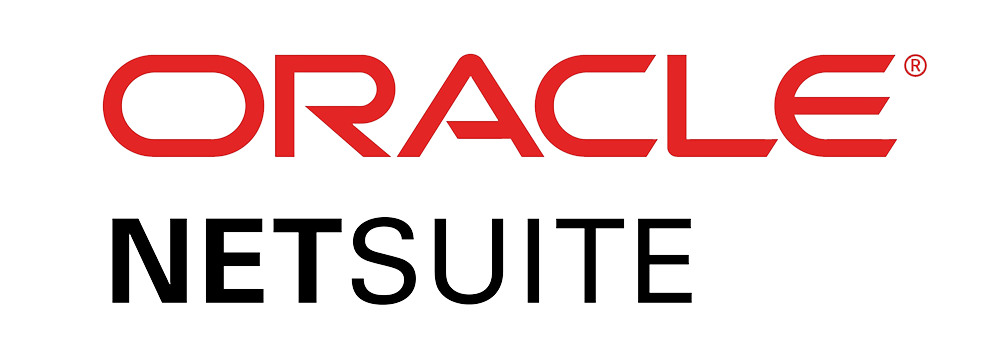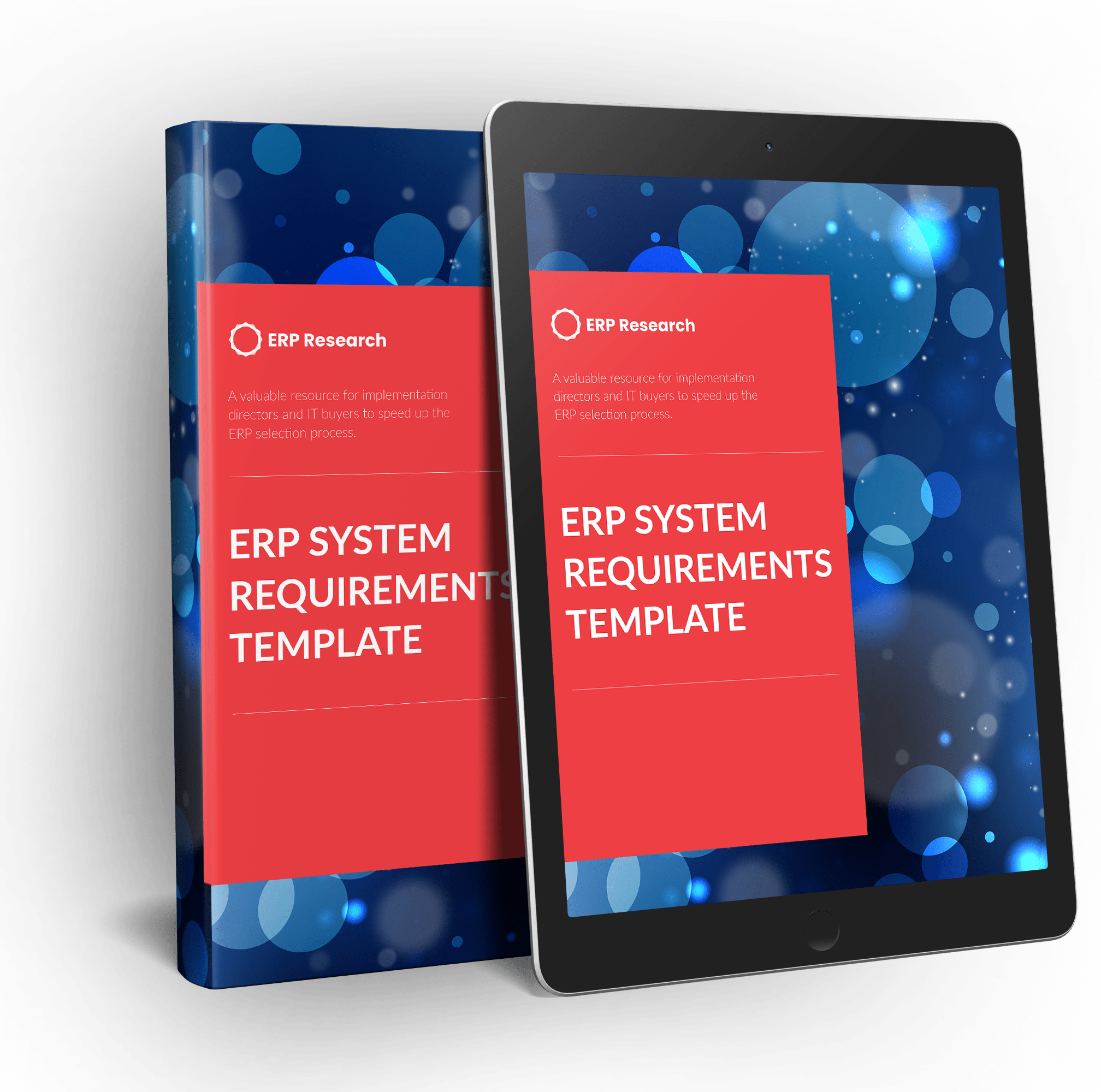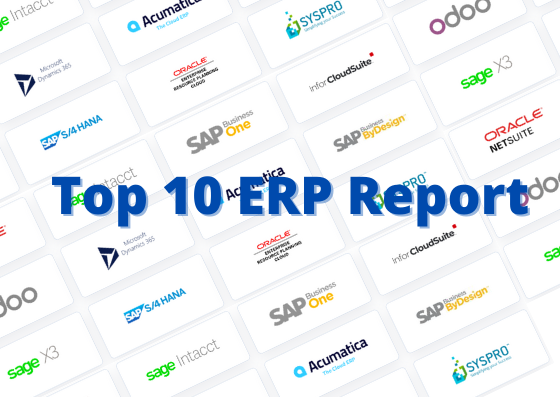10-5,000 Employees
$5-500M Revenue
✅ Cloud
❌ On-Premise
15,000+
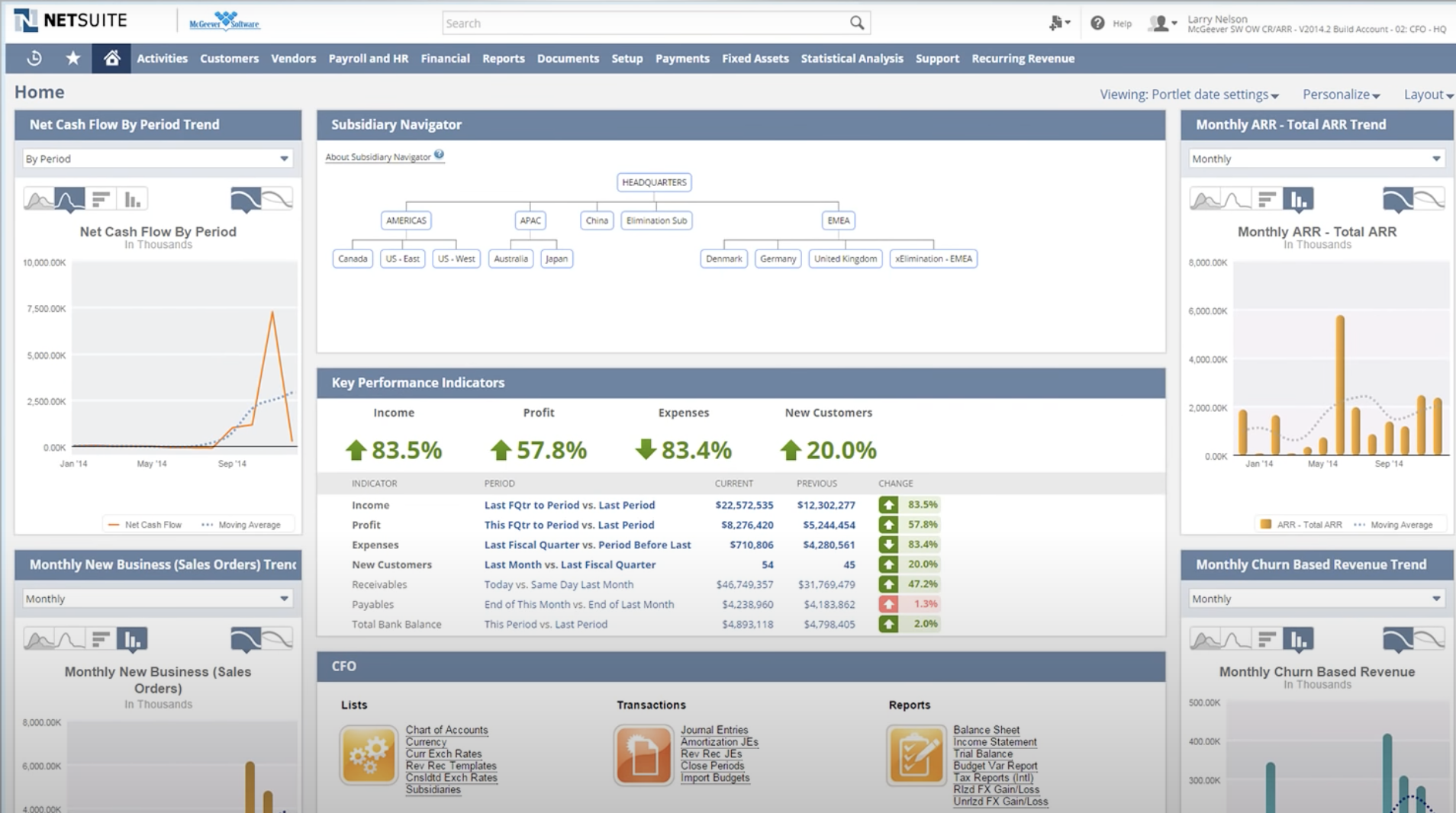
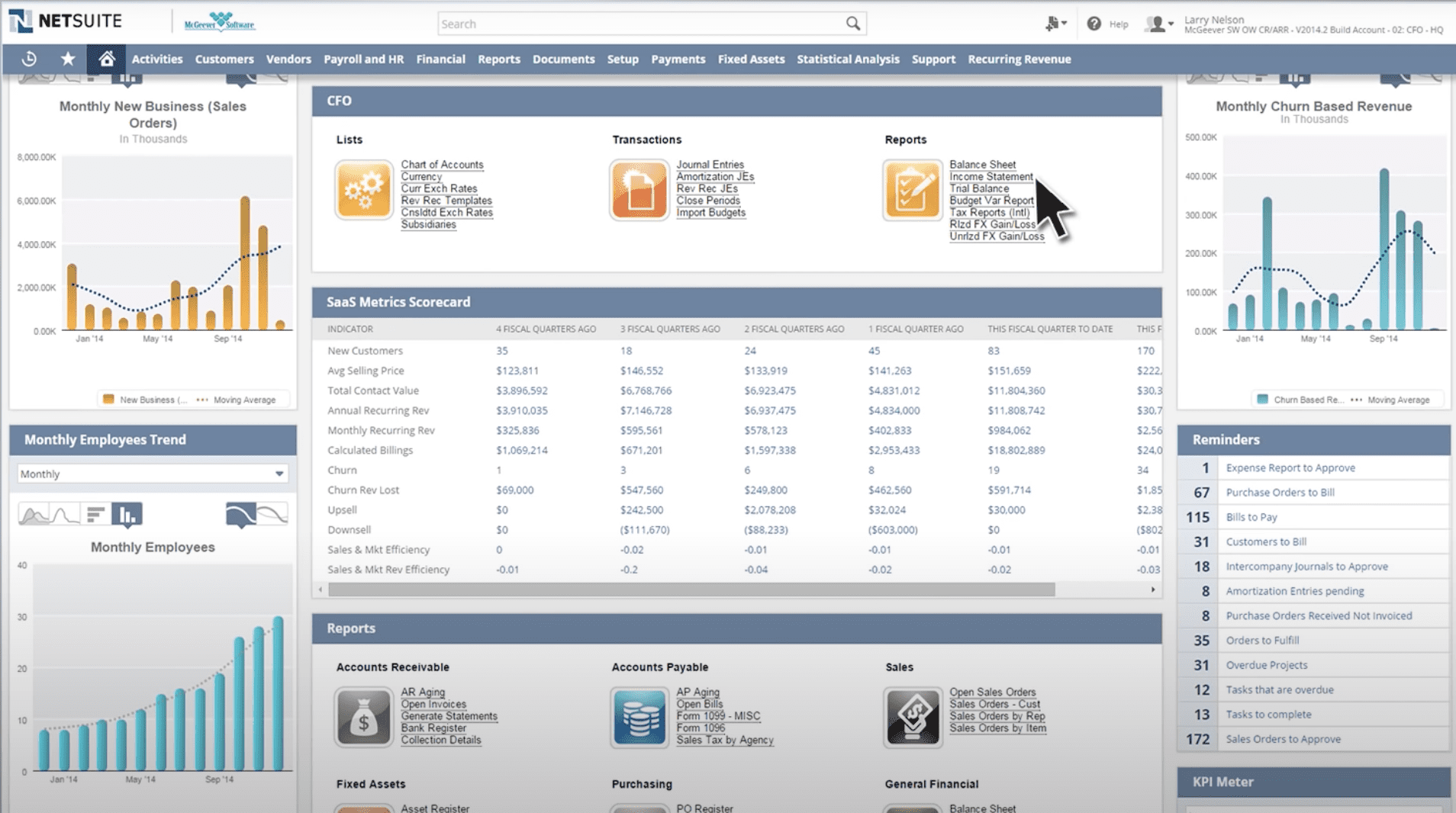
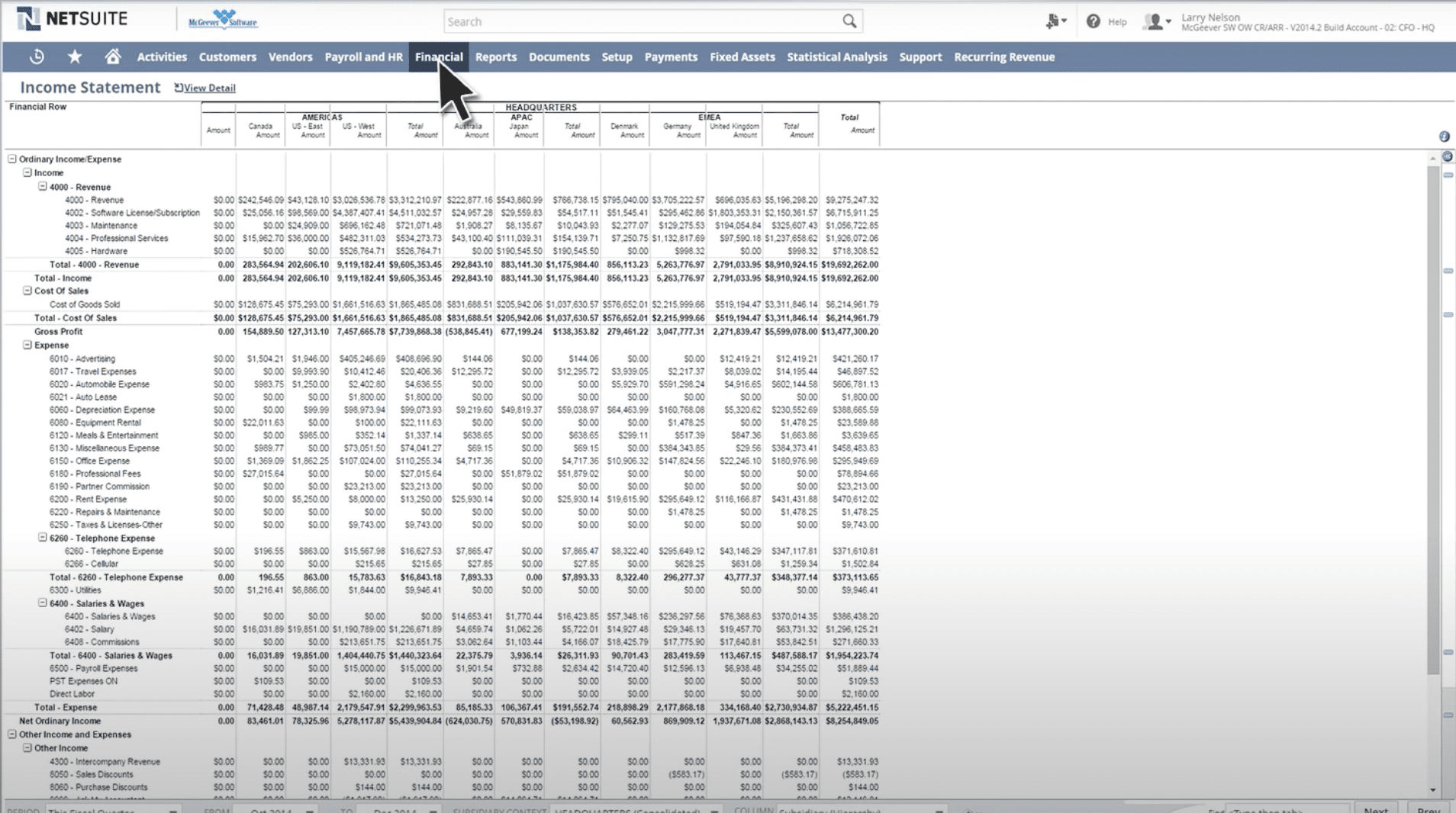
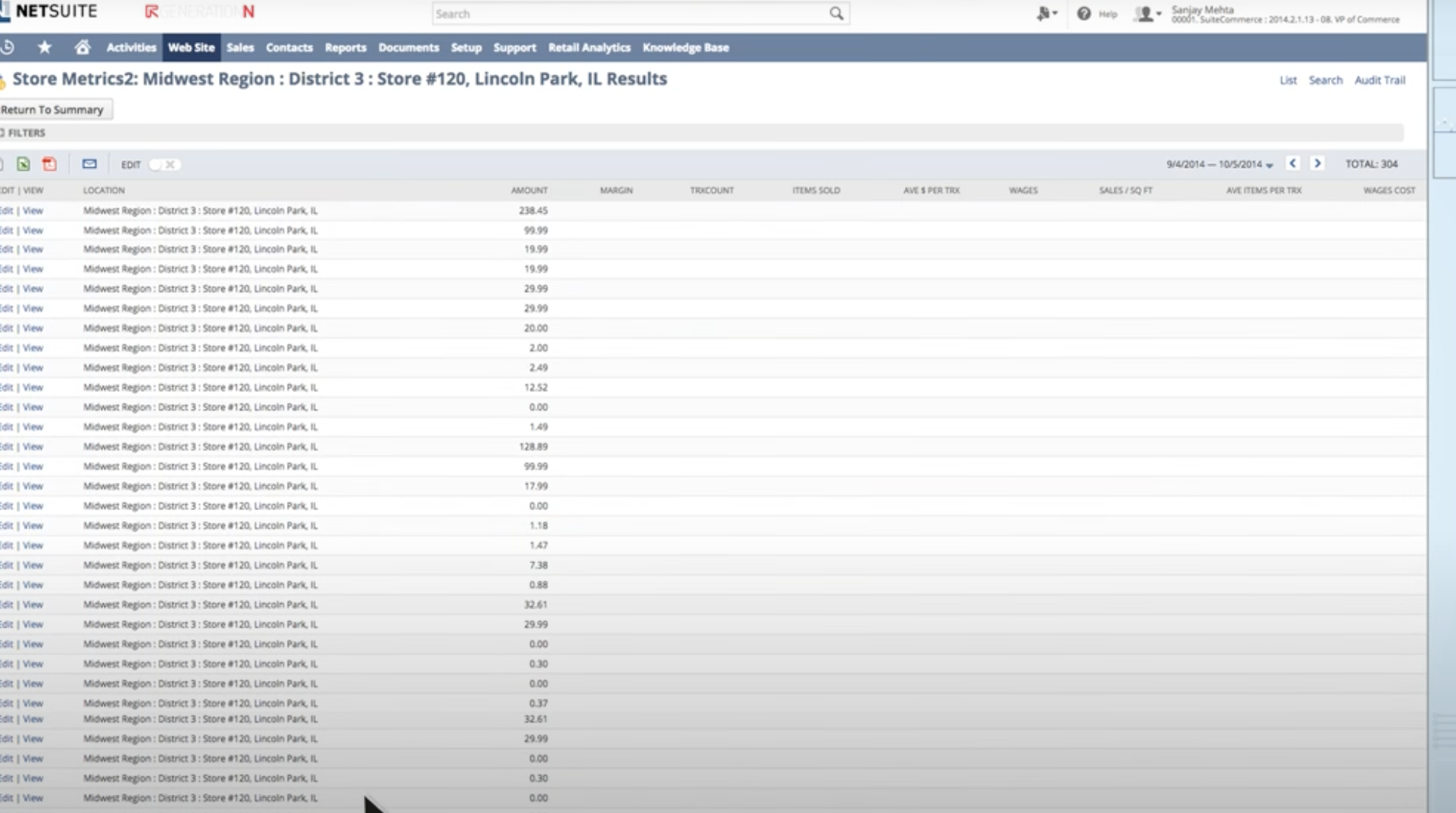
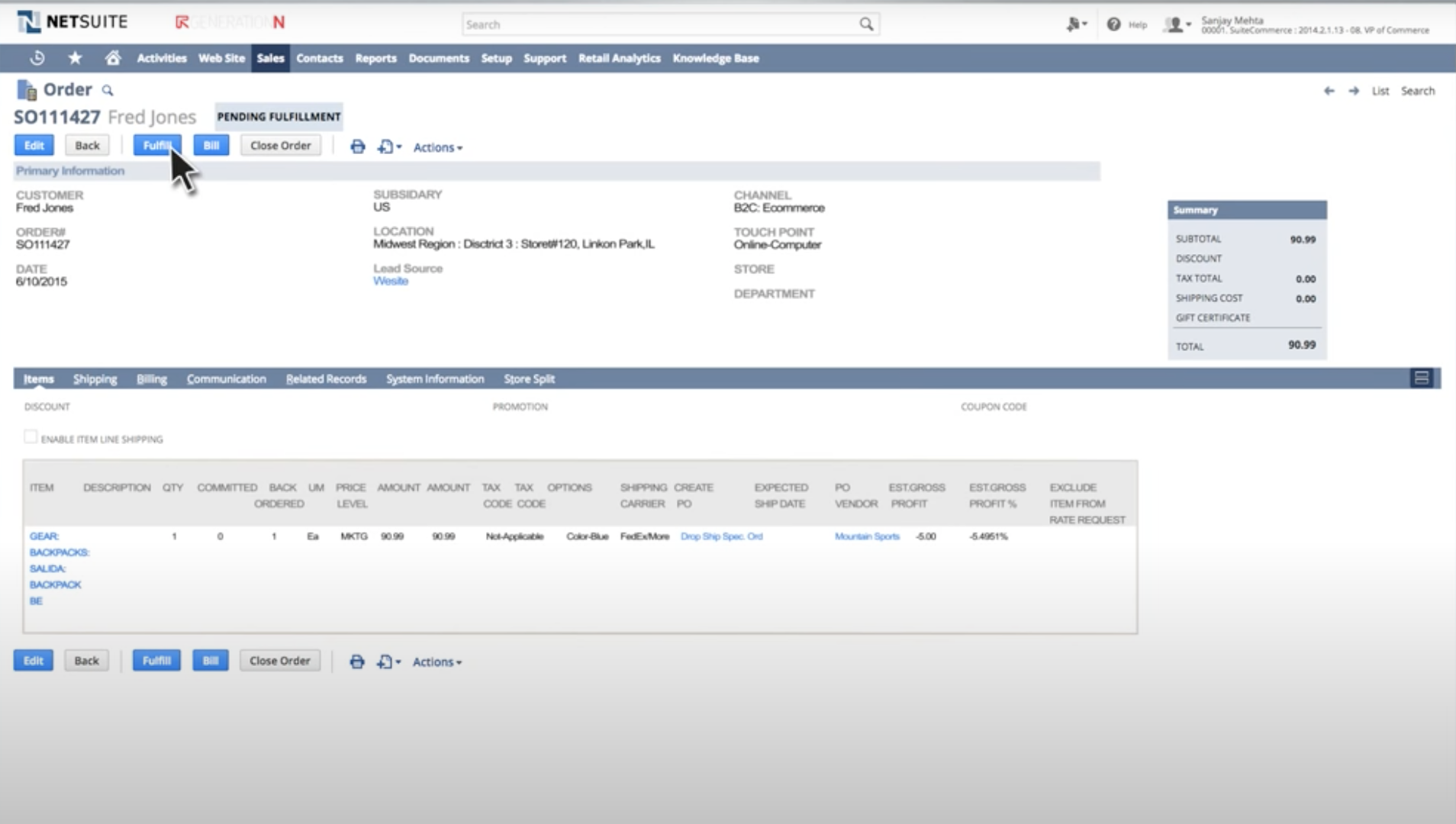
WHAT IS NETSUITE ERP?
-
MODULES & FEATURES
-
PROS & CONS
-
INDUSTRY FIT
-
HISTORY
-
DEPLOYMENT
-
FAQ
Modules & Features List
Financial Management & Accounting
Oracle NetSuite's financial management and accounting module includes accounts receivable, accounts payable, multi-currency, billing, invoicing and statutory reporting. With thousands of customers around the world, NetSuite also supports several localizations delivered out of the box or via its network of partners.
NetSuite's accounting module is a comprehensive financial management solution designed for businesses of all sizes. It offers a range of features including accounts payable and receivable management, general ledger, bank reconciliation, financial reporting, and budgeting and forecasting.
The module allows users to automate many financial processes, reducing manual errors and improving efficiency. It also offers customizable dashboards and reports, providing real-time visibility into a company's financial performance. Additionally, it is integrated with other modules within the NetSuite system, such as inventory man
General Ledger and Financial Reporting:
NetSuites finance module and GL allows for the tracking and reporting of financial transactions, including income and expenses, assets, liabilities, and equity. Users can create and customize financial statements, such as balance sheets and income statements, to gain insight into the financial performance of the organization. It also allows for the creation of different chart of accounts, which is a way to group similar financial transactions together for reporting and budgeting purposes.
Multi-currency Support:
Netsuites finance module provides a feature that allows the user to conduct financial transactions in multiple currencies, automatically converting them to the base currency. It also enables the generation of financial reports in multiple currencies, providing a clearer understanding of the organization's global financial performance. This feature also allows the user to set the currency exchange rate, which can be done automatically or manually, and also allows to set a different rate for different date.
Budgeting and Forecasting:
Netsuites budgeting and forecasting feature allows users to create budgets and forecasts for various departments, projects, or products, and compare them to actual financial results. This helps to identify variances and make adjustments as needed to improve financial performance. The budgets can be created in different levels, such as by department, business unit, or location. This feature also allows to create different scenarios, to compare different budget scenarios and choose the best one.
Financial Consolidation:
Netsuites accounting module includes the consolidation of financial information from different subsidiaries, departments, or projects, providing a unified view of the organization's financial performance. This feature allows to consolidate the financial information from different entities, and also allows to do the consolidation in different levels, such as by department, business unit, or location.
Accounts Payable and Accounts Receivable:
This feature allows the user to manage and track vendor invoices and customer billing and payments. It includes functionalities like creating invoices, recording payments, and generating reports on accounts payable and receivable. This feature allows to create different types of invoices, such as recurring, credit memos, debit memos, and also allows to apply different payment terms, such as net 30, net 60, etc.
Cash Management:
Netsuite cash management enables the user to track and manage cash flow, including the management of bank accounts, reconciling bank statements, and generating cash flow reports. This feature allows to create different bank accounts, and to reconcile them with the bank statements, using different methods of reconciliation, such as by transaction, by check, or by deposit. It also allows to generate cash flow reports, which provide a detailed view of the cash inflows and outflows.
Financial Period Close Management:
Netsuite's financial closing feature streamlines the process of closing the financial period by automating tasks such as journal entries, account reconciliations, and financial statement preparation. This feature allows to close the period in different levels, such as by department, business unit, or location, and also allows to set up different close periods for different entities.
Tax Management:
NetSuite has a tax management feature that allows the user to manage and track sales and purchase taxes, including the calculation, collection, and remittance of taxes, as well as the generation of tax reports. This feature allows to set up different tax codes, and to apply them to the different transactions, such as invoices, sales orders, and purchase orders. It also allows to set up different tax schedules, and to calculate the taxes based on different methods, such as by location, by product, or by customer.
Audit Trail and Controls:
Netsuite's finance module and accounting package has a feature that provides a record of all financial transactions and changes, allowing for easy auditing and compliance with financial regulations. It also includes functionalities like user permissions, which ensures that only authorized users can access financial information and make changes. It also allows to set up different levels of access permissions for different users, such as view only, edit, or approve. This feature also allows to set up different audit trails, such as by transaction type, by department, or by location.
Customizable Financial Statements:
NetSuite's finance module allows the user to create and customize financial statements, such as balance sheets and income statements, to gain insight into the financial performance of the organization. This feature allows to create different financial statements, such as balance sheet, income statement, cash flow statement, and also allows to customize them by adding different columns, such as department, location, or project. It also allows to generate different financial statements for different periods, such as by quarter, by year, or by month.
Bill of Materials Management
NetSuite's Bill of Materials (BOM) functionality provides a robust set of features designed to simplify the creation and management of BOMs. These include the ability to define the type and quantity of materials, components, and assemblies needed for each product through BOM Creation and Management. The software supports multi-level BOMs, which is crucial for complex products with multiple levels of assembly. BOM revisions and version control allow for tracking changes, creating new revisions with unique identifiers and effective dates, and archiving old versions.
In addition to these, NetSuite's BOM functionality includes routing, linking each operation with a specific step in the BOM, and a 'Component Where-Used Inquiry' feature that identifies all the BOMs where a specific component is used. Cost roll-up features aggregate the costs of all the components in a BOM to determine the total estimated cost of manufacturing the final product. Finally, NetSuite's BOM functionality seamlessly integrates with other modules for efficient operations, and it also offers industry-specific BOM capabilities.
Material Requirements Planning
NetSuite MRP is a module within the comprehensive NetSuite ERP system. It focuses on Material Requirements Planning (MRP), a process that helps businesses plan their resource requirements including raw materials, production capacities, and scheduling to meet customer demands efficiently. This system plays a crucial role in ensuring that materials are available for production, products are available for delivery to customers, and that manufacturing activities are planned efficiently.
Production Planning & Scheduling
NetSuite's production planning module offers a comprehensive suite of tools to streamline and optimize manufacturing processes. It enables businesses to predict future demand through its Demand Planning feature, using historical data, sales forecasts, and market trends. This module also provides a Master Production Schedule (MPS) based on demand forecasts, and a Material Requirements Planning (MRP) feature that calculates necessary materials based on the MPS and current inventory levels. Further, Work Order Management generates detailed work orders for production tasks, while Routing and Scheduling tools optimize resource use and ensure timely production. Real-time tracking and detailed reporting offer visibility into production processes, and Capacity Planning assists in managing production capacity to meet demand forecasts and avoid bottlenecks
Quality Management (QMS)
NetSuite's Quality Management solution supports your organization in establishing and maintaining a consistent level of quality in your products and services. With a systematized, customizable approach to inspections, tests, reworks, and reports, it ensures that quality management becomes an integrated part of your business processes.
Professional Services Automation (PSA)
Oracle NetSuite OpenAir module provides robust professional services automation functionality covering project management and accounting, resource management, billing, revenue recognition, time recording and expenses.
SuiteCommerce
Oracle NetSuite omnichannel commerce unifies the various buying channels including point of sale (POS), ecommerce/online sales or traditional sales order processing, for both B2B & B2C business models.
Supply Chain Management (SCM)
Oracle NetSuite’s manufacturing, distribution and supply chain management capabilities are all built on the premise that the physical location that a product is made or stored in should be irrelevant to your decision making process—it may add to your lead time, but NetSuite let's you manage it all with ease.
Human Resources (SuitePeople)
SuitePeople enables managers and HR professionals to streamline employee information, new hires, employee onboarding, payroll, promotions and compensation changes, all from a single Suite. SuitePeople also provides employees with the ability to request time-off, access employee directories and organization charts, monitor upcoming vacation schedules, monitor new hires and publicly recognize peers for good work.
Customer Relationship Management (CRM)
Oracle NetSuite CRM provides global visibility into and management of every aspect of CRM, including marketing campaigns, sales opportunities, forecasts, customer service, partner management and more
Reporting, Dashboards and Analytics
Pros & Cons
Pros:
- Netsuite is one of the most widely used Cloud ERP systems in the world, meaning that research and development is continuous.
- There are hundreds of Netsuite partners around the world to support you, many of which provide unique industry capabilities and templates for specific business models.
Cons:
- Netsuite is made up of several solutions which were acquired over the years and some users suggest that this leads to issues.
- Many Netsuite users complain of price hikes after the initial contract period.
Industry Fit
Netsuite ERP is used by companies in various industries, including:
Professional Services
Oracle NetSuite offers a lot of functionality that can help professional services firms including integrated financial management & accounting, deep project management, billing, customer relationship management and more. This is provided via one of Oracle NetSuite's early acquisitions, OpenAir for Professional Services Automation.
Ecommerce & Online Retail
With integrated sales, marketing, stock and financials, Oracle NetSuite ERP has proven to be popular with many small and growing e-commerce businesses. Oracle NetSuite even offers an integrated commerce portal or can easily be integrated with common eCommerce platforms such as Shopify or Magento.
Retail
Real Estate
Healthcare
Medical Devices
Agencies
Wholesale Distribution
Software-as-a-Service (SaaS)
Oracle NetSuite's core products were built alongside the success ofOracle NetSuite itself, one of the first SaaS companies in the world. As such it provides strong capabilities for billing, revenue recognition and professional services automation. This allows SaaS businesses to manage the whole quote to cash process as well as project fulfilment.
History
Oracle NetSuite was first created in 1998 under the name 'Netledger' by entrepreneur Evan Goldberg, providing web accessible financial and accounting software. From the very beginning, Oracle NetSuite had huge involvement from Oracle and the money to start the company was provided by then CEO of Oracle and Founder, Larry Ellison to the tune of $125 million. Many of the early employees at NetSuite came from Oracle, including the CTO.
Very quickly, Oracle NetSuite made several acquisitions to complement it's core accounting functionality, including Bronto, Venda, OpenAir, QuickArrow, Monexa, Retail Anywhere, OrderMotion, iQuity Solutions, TribeHR & Element Fusion. With these acquisitions under it's belt, Oracle NetSuite now offers rich capabilities for marketing automation & CRM, ecommerce, human resources solutions, professional services automation and more.
In December 2007, NetSuite IPO'd and floated on the New York Stock Exchange.
Estimates suggest that as of 2021, Oracle NetSuite has over 24,000 customers around the world running their ERP software.
Deployment Options
Oracle NetSuite is only offered only as a Cloud ERP solution, in a true Software-as-a-Service (SaaS) model.
The solution is hosted by Oracle NetSuite themselves and includes quarterly upgrades and product support directly from the vendor.
Oracle NetSuite customers can deploy the ERP solution in any of 11 data centers globally.
Frequently Asked Questions (FAQ)
Can Oracle NetSuite do payroll?
Payroll is offered as part of the core Oracle NetSuite offering under the SuitePeople umbrella for HCM. Despite this, users have claimed that payroll in Oracle NetSuite is not provided by the core Oracle NetSuite functionality and is provided by an outsourced provider.
How much does Oracle NetSuite cost?
As with any ERP solution, Oracle NetSuite has it's own set licensing, implementation and support costs. The minimum cost of a Oracle NetSuite subscription is around $25,000 annually, with implementations being 1-4x that cost. Get a free Oracle NetSuite quotation here.
Can Oracle NetSuite integrate with Salesforce?
Yes, Oracle NetSuite offers many prebuilt integration scenarios with Salesforce solutions including CRM, marketing and more.
Which companies use Oracle NetSuite?
Oracle NetSuite is used by more than 15,000 companies in multiple industries, all over the world. The typical Oracle NetSuite customers are small businesses and SMEs ranging from $5M in revenue to multiple billions and with as few as a couple of employees to several thousands.
Can you customize Oracle NetSuite?
Yes, Oracle NetSuite offers many out of the box customization capabilities.
Where is Oracle NetSuite hosted?
According to the Oracle NetSuite website, Oracle NetSuite can be hosted in any of 11 global data centers, increasing from 5 initially deployed by Oracle NetSuite themselves by leveraging additional Oracle data centres. This gives Oracle NetSuite customers the ability to leverage hosting in North America, Europe, Germany, China, Japan, Australia and Singapore.
For companies who need to follow specific rules about where their data is stored or organizations that are simply risk averse, this provides a great deal of flexibility and choice versus other Cloud ERP providers.
Who are the Oracle NetSuite competitors?
We commonly see customers evaluating other Cloud ERP solutions such as Microsoft 365, Sage Intacct, Acumatica and SAP Business ByDesign alongside NetSuite.
How can I get a NetSuite demo?

Download our Top 10 ERP Report Now
Sage Intacct
Sage Intacct is a cloud-based financial management software designed for small and mid-sized businesses that require an intuitive and flexible accounting solution. It offers a range of features including accounts payable, accounts receivable, general ledger, time and expense management, and financial reporting. The software is user-friendly and can be customized to meet the specific needs of the user. When compared to Netsuite, Sage Intacct is known for its user-friendliness and flexibility, making it a preferred choice for businesses that require a more streamlined financial management process.
Sage Intacct
Sage Intacct is a cloud-based financial management software designed for small and mid-sized businesses that require an intuitive and flexible accounting solution. It offers a range of features including accounts payable, accounts receivable, general ledger, time and expense management, and financial reporting. The software is user-friendly and can be customized to meet the specific needs of the user. When compared to Netsuite, Sage Intacct is known for its user-friendliness and flexibility, making it a preferred choice for businesses that require a more streamlined financial management process.
SAP Business One
![]()
SAP Business One is an all-in-one business management solution designed for small and mid-sized businesses looking for a comprehensive ERP system. One of the notable features of SAP Business One is its ability to integrate with other SAP solutions, making it an excellent choice for companies that already use SAP products. NetSuite, on the other hand, is a cloud-based ERP system that offers a broad range of functionalities, including financials, CRM, inventory management, and e-commerce. While both systems offer similar features, NetSuite's cloud-based platform provides businesses with more flexibility and scalability, making it an ideal option for growing businesses.
Acumatica
![]()
Acumatica is a cloud-based ERP solution that offers comprehensive functionality for businesses of all sizes. Designed for flexibility and scalability, Acumatica provides a modern user interface, advanced reporting tools, and seamless integration with third-party applications. Compared to Netsuite, Acumatica is more customizable and cost-effective, allowing businesses to tailor the system to their unique needs without breaking the bank. Additionally, Acumatica's open architecture and extensive API library make it easy to integrate with other software, enabling businesses to streamline their operations and improve productivity.
Infor CloudSuite Industrial

Infor CloudSuite Industrial is designed specifically for manufacturing and distribution businesses, offering advanced features such as supply chain management, quality control, and production planning. Unlike Acumatica, Infor CloudSuite Industrial provides industry-specific functionality right out of the box, which can help you streamline your operations and improve efficiency. Additionally, when compared to NetSuite, Infor CloudSuite Industrial offers a more specialized and tailored solution for industrial businesses. So, if you're in the manufacturing or distribution industry and need a comprehensive ERP solution, you may want to consider Infor CloudSuite Industrial.
Oracle ERP Cloud

Oracle ERP Cloud is a comprehensive enterprise resource planning solution that caters to the needs of organizations across various industries. It offers a suite of cloud-based applications that automate and streamline business processes, enhance visibility into operations, and provide real-time insights into performance metrics. The solution also offers robust security features to protect sensitive data and ensure compliance with industry regulations. When compared to NetSuite, Oracle ERP Cloud provides a more extensive set of features and functionalities, making it a better fit for larger organizations with complex business processes.
Speak to an Independent ERP Expert
ERP Research helps you to:
✅ Shortlist ERP software & implementation partners.
✅ Arrange custom ERP demonstrations and quotes.
✅ Access our huge library of ERP reports, templates and project documentation.
Users Per Month:
18,000+
ERP Projects:
4000+
Industries Covered:
22+
Third Party Extensions
In this section we'll discuss the third party extensions and add-ons for Oracle NetSuite ERP which provide additional functionality to the coreOracle NetSuite product. Oracle NetSuite calls these add-ons and modules 'SuiteApps'. SuiteApps are developed by members of the Oracle NetSuite Cloud Developer network which is Oracle NetSuite's third party developer program.
SuiteApps extend the functionality of the core Oracle NetSuite product to perform tasks and capabilities for specific company and industry needs. Although SuiteApps generally work well with Oracle NetSuite, they are ultimately developed and supported by third parties rather than by Oracle or NetSuite themselves.
Oracle NetSuite SuiteApp third party extensions include additional functionality including:
- Shipping & logistics integrations.
- Expenses management & invoice automation.
- Payment gateways and processing.
- Additional localization packages.
- Configure, Price, Quote (CPQ) solutions.
- EDI integration.
- Barcode scanning.
- Field Service Management (FSM) extensions.
Integration & SuiteTalk
Oracle NetSuite can be integrated with other third party applications and services. The primary way to achieve this is through the cloud using Oracle NetSuite SuiteTalk. SuitTalk REST API provides a REST-based interface for interacting with Oracle NetSuite and acts as an integration channel that extends the capabilities of SuiteTalk.
Oracle NetSuite Localization, Languages & Support
In this section we'll cover the localization packs, languages and support available in Oracle NetSuite.
Localizations
Oracle NetSuite claims that their software has been deployed in over 110 countries, configured towards local tax standards.
However, from Oracle NetSuite's SuiteApp website, many of them are offered via local partners rather than via Oracle NetSuite themselves.
Languages
Oracle NetSuite currently supports 27 languages.
Support
Oracle NetSuite themselves offer two levels of support (SuiteSupport): basic and premium which offer different service level agreements (SLA's). Oracle NetSuite's local partners also offer further local support.
Oracle Netsuite Consulting
Are you looking for Oracle Netsuite consulting providers and alliance partners? Check our directory below.
Netsuite ERP Pricing
Get a Netsuite quote today.
Netsuite ERP Demo
Get a Netsuite demo, personalized to your requirements.


